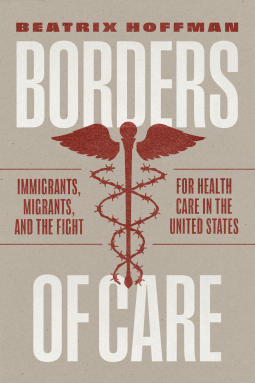
Borders of Care
Immigrants, Migrants, and the Fight for Health Care in the United States
by Beatrix Hoffman
This title was previously available on NetGalley and is now archived.
Send NetGalley books directly to your Kindle or Kindle app
1
To read on a Kindle or Kindle app, please add kindle@netgalley.com as an approved email address to receive files in your Amazon account. Click here for step-by-step instructions.
2
Also find your Kindle email address within your Amazon account, and enter it here.
Pub Date Feb 11 2025 | Archive Date Dec 03 2024
Talking about this book? Use #BordersofCare #NetGalley. More hashtag tips!
Description
For the roughly ten million undocumented immigrants living in the United States, federal health care coverage is out of reach. Barred from Medicare, Medicaid, and the Affordable Care Act, most rely on hospital emergency rooms when they get sick, or clinics that don’t inquire about immigration status. Further obstacles to health care, including discrimination and the fear of deportation, mean that immigrants, undocumented or not, seek and receive less medical attention than any other population in the country. Yet immigrants haven’t always been ostracized from health care in the United States—providers and activists have for over a century worked to make medical services available to newcomers and migrants, including, at times, the undocumented.
Drawing together stories from diverse communities from the mid-nineteenth century to the present, Borders of Care examines how health care in the United States has both included and excluded immigrants. Beatrix Hoffman analyzes both the health and immigration systems, adding to our understanding of why these structures, and the policies that support them, have resisted reform. Moreover, she shows that immigrants, often scapegoated as burdens on the health-care system, have strengthened it through their responses to systemic exclusion. By creating hospitals and clinics, serving as practitioners, fighting for safer workplaces, filing lawsuits, organizing and protesting, immigrants and migrants have improved medical access for everybody and advanced the idea of health care as a universal right. As accessible as it is authoritative, Hoffman’s survey could not be more timely.
Available Editions
| EDITION | Other Format |
| ISBN | 9780226820866 |
| PRICE | $25.00 (USD) |
| PAGES | 288 |
Available on NetGalley
Featured Reviews
 Educator 1511420
Educator 1511420
The way a society treats it most vulnerable members (which would include immigrants and migrants) will show you their values. Hardly just relegated to the present or the past, adequate healthcare has been rationed or nonexistent for these groups. The pandemic has only shone a brighter light on this division and why it is so important for healthcare to be a right, not a privilege.
THis book dives into the world of migrants, immigrants, refugees and how do they find medical care within the United States. I had never thought of the subject but WOW, this book does a great job exploring this issue.
The author takes a HUGE history and condenses it to digestible pieces. I loved the formatting of the book, going by time and then putting in as many migrants, immigrants, refugees as possible. It was easy to understand and I loved how the author would say ok the migrants were denied health care so this is what they did about it.
I also liked that the author was preachy. THe author laid out the facts and let the reader decide if it was fair or not.
I learned so many things with this book. Like the Mexican Farm workers had more rights then US workers in regards to Unions and medical care. I had never heard of that before. Of course, then American workers got jealous and ended it.
This is a timely book and went all the way up to the COVID crisis.
Everyone should read this book about migrants, immigrants, and refugees and health care. But more importantly this is an important work on how Americans think WHO should have health care.
I highly recommend this book for anyone who is wondering about immigrants and health care.
Thank you to NetGalley, Chicago University Press, and Beatrix Hoffman for an Advanced Reader's Copy of this title!
"Borders of Care" follows the rise and fall of over a century of healthcare activism for immigrants, undocumented migrants, and those otherwise on the margins of American society, and the ways in which these groups have been both included and excluded from what many consider the universal right to healthcare. Hoffman examines both the health and immigration systems in the United States from their founding to now, building a picture of how these structures have resisted reform using detailed analysis of the existing historical record and firsthand accounts of both those who sought to restrict and widen access to healthcare for marginalized groups. She further shows that in responding to systemic exclusion, the very individuals who exist as scapegoats and burdens on the healthcare then and now have actually strengthened the healthcare system through creating hospitals and clinics, serving as practitioners, fighting for safer workplaces, filing lawsuits, and organizing and protesting.
This is an incredibly timely text as we enter another era of misinformation, scapegoating, and demonization of migrant and undocumented residents of the United States. Though research has shown (and it well documented in this book - about 20% of the pages here are dedicated to the sources the author used for those who are interested in a true deep dive), obstacles to healthcare such as fear of deportation, discrimination, and lack of access to Medicare, Medicaid, and the Affordable Care Act mean that mean that immigrants, undocumented or not, seek and receive less medical attention than any other population in the country. "Borders of Care" is an incredibly well-researched primer for those who wish to understand how the American healthcare system has existed to serve (and, unfortunately, at many times to disempower and exclude) the immigrants, migrants, first-nations, and otherwise misaligned citizens throughout the centuries, and the attitudes, policies, world events, and philosophies from the community level on up that has brought us to where we stand in 2025. This is exactly the kind of information I wish schools - both at the primary level, but especially in graduate level medication such as medical school - took time to focus on, as a) I believe few people really have an idea of how the American health system developed over the last century, and b) reading about the activism that bought - with blood, sweat, and death - many of the healthcare rights we do have today (and stand to lose) came to be.
Bravo to Beatrix Hoffman on a studious, yet interesting look into healthcare history, and I will definitely be checking out her other book as well!
 Reviewer 1447287
Reviewer 1447287
This book is is a comprehensive examination of how the U.S. health care system has historically both included and excluded immigrant populations. Spanning from the mid-nineteenth century to the present, Hoffman delves into the intertwined nature of health care and immigration policies, shedding light on the systemic barriers that have prevented immigrants, especially the undocumented, from accessing necessary medical services.
Overall, Hoffman offers an insightful and timely analysis of the complexities at the intersection of immigration and health care in the United States, highlighting the resilience and contributions of immigrant communities in the ongoing fight for equitable health care access.
Readers who liked this book also liked:
Megan Greenwell
Business, Leadership, Finance, Nonfiction (Adult), Politics & Current Affairs


















